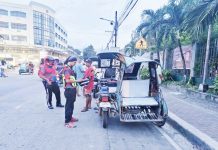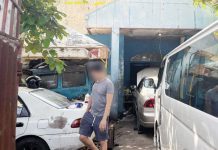
ILOILO City – The country has started giving out anti-coronavirus disease 2019 (COVID-19) shots. This got several sleeves rolling up. But here, Ilonggos – even healthcare workers – have yet to come to a resolve.
The AstraZeneca vaccines that the city and province of Iloilo ordered are expected to arrive by the second half of the year yet but the Department of Health (DOH) confirmed that Western Visayas is slated to receive China-based Sinovac vaccines soon.
How willing are Ilonggos to get these free shots?
“Mahulat pa ako kun may malain nga resulta,” a 79-year-old retired government employee told Panay News. “Siguro mga four to six months matapos ang iban.”
He was from Iloilo’s Santa Barbara town and expressed preference for the Pfizer vaccine.
“Ang akon bata kag hinablos sa United States, Pfizer ila gin gamit. Hasta subong, waay man sila reklamo. Gani gusto ko Pfizer man maskin ako pa mabayad. Pero lantawon ta before the end of the year,” he added.
Thirty-seven-year old Mylin, a single mother who works as a sales attendant here, was also undecided whether to get vaccinated or not. Her worry was also about the vaccine’s safety.
Meanwhile, Danilo, a 45-year-old school utility worker in Cabatuan town, said though he was fearless, he was not getting the vaccine because “it might trigger” his health condition.
“Waay man gid ta sang dapat kulbaan. Kaso ako abi may ginabatyag sa lawas amo na nga indi ko magbaton sang vaccine,” he said.
For couple Niel and Kat Casero, on the other hand, the decision whether to be vaccinated or not would depend on their health status.
Kat admitted that she had fears about the possible adverse effects of the vaccine. Aside from that, she had a preexisting ailment that might be “triggered” by the vaccine.
Her husband Niel, meantime, said if it was needed for his work as seafarer, he would get the vaccination. If this wasn’t mandatory, however, he won’t get vaccinated.
Police Lieutenant Colonel Joem Malong, public information officer of Police Regional Office 6, is in favor of getting vaccinated – and any brand of COVID-19 vaccine would do.
“(This is) for the safety of my family and the police organization since I’m dealing with different people every day,” she said.
“As a PIO I’m also dealing with the media so I need to submit myself for vaccination para mangin safe man ang media during interviews,” she added.
Her family members, including her police officer husband, were also willing to be vaccinated.
HEALTH WORKERS ON VACCINES
Dr. Mary Jane Juanico, head of the infectious disease cluster of DOH Region 6, confirmed to Panay News that Western Visayas will be getting part of Sinovac’s COVID vaccine China donated to the Philippine government.
As soon as the vaccine allocation for the region arrives – Juanico could not confirm as to when yet – they would prioritize healthcare workers.
The health department eyed personnel of the Western Visayas Medical Center (WVMC) in Mandurriao district and Corazon Locsin Montelibano Memorial Regional Hospital in Bacolod City as priority for Sinovac vaccination.
Western Visayas has more or less 27,000 healthcare workers, Juanico said. However, a recent survey showed that only 50 to 60 percent were willing to be vaccinated.
“Ang survey nag gwa previously, indi man sia brand specific,” Juanico clarified.
In a radio interview, Richard Saltin, designated spokesperson for COVID-19 of WVMC, said they conducted a survey among their staff.
Vaccine brands AstraZeneca and Pfizer were considered.
Out of the 1,995 personnel who responded to the survey, 899 were willing to be inoculated, Saltin said over DYOK Aksyon Radyo Iloilo.
Some 493 personnel said they were fearful ofr the possible side effects, while 561 personnel were still undecided.
With the arrival of Sinovac vaccines, Saltin said they would conduct another survey to know who were willing to be injected with such.
Juanico, for her part, clarified they were not going to force health workers to have themselves vaccinated.
“If there are refusals…wala man kita naga-impose sang mandatory vaccine. This is all voluntary,” said Juanico.
Earlier, the Philippine Society for Microbiology and Infectious Diseases (PSMID) urged vaccine-hesitant Ilonggos to learn to trust science and experts when it came to vaccine safety.
“We should trust medical experts who developed the vaccines. They devoted many years studying different infectious diseases,” stressed Dr. Yvette Silubrico, vice president of PSMID Western Visayas Chapter.
Medical experts from the PSMID-Western Visayas debunked myths that may have fueled public distrust to anti-coronavirus shots.
Silubrico cited misinformation on social media as one of the common reasons why people were shunning immunization.
Side effects after getting injected with COVID vaccines are normal and temporary, said Dr. Ellamae Divinagracia, an infectious disease specialist from PSMID-WV.
“May mga side effects ka gid nga mabatyagan kay response na sang lawas mo sa vaccine. Anything nga ginsulod dira ma-react gid na ya ang imo immune system… pwede mahilanat ka or maka-experience sang headache pero these are temporary… like two days,” Divinagracia explained.
Another PSMID-WV infectious disease specialist, Dr. Ludovico Jurao, echoed Divinagracia.
He reiterated that all vaccines have side effects.
“Granting nga may adverse reaction gid man, as far as the vaccine at the moment is concerned, ang claim naton is they prevent severe diseases,” Jurao said.
Jurao cited, for instance, the pandemic more than 100 years ago due to influenza.
“Influenza was a pandemic and so many people died. The vaccination process went into effect and now we are just living with influenza,” Jurao said./PN





